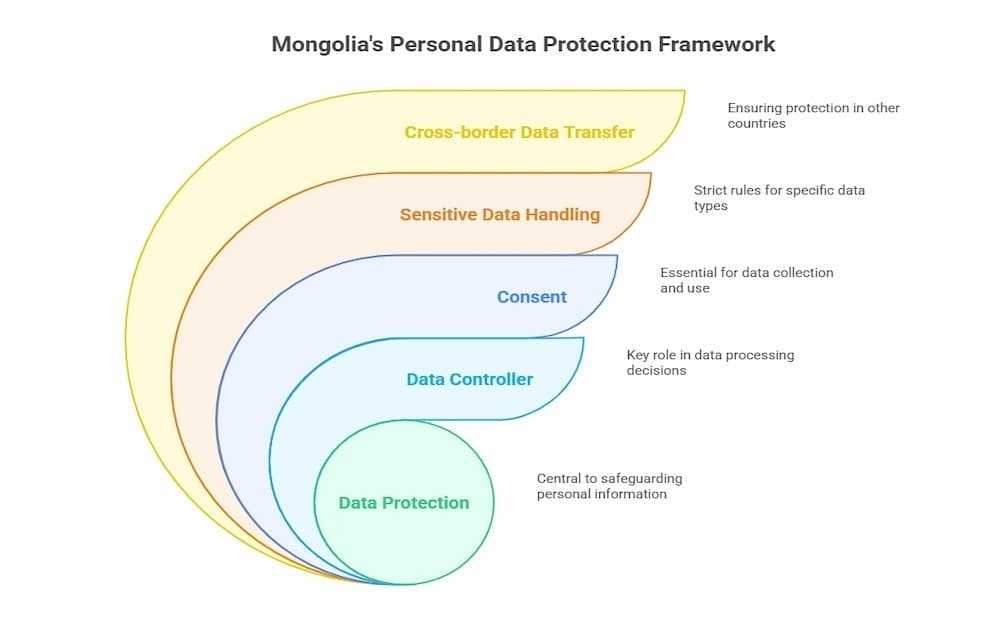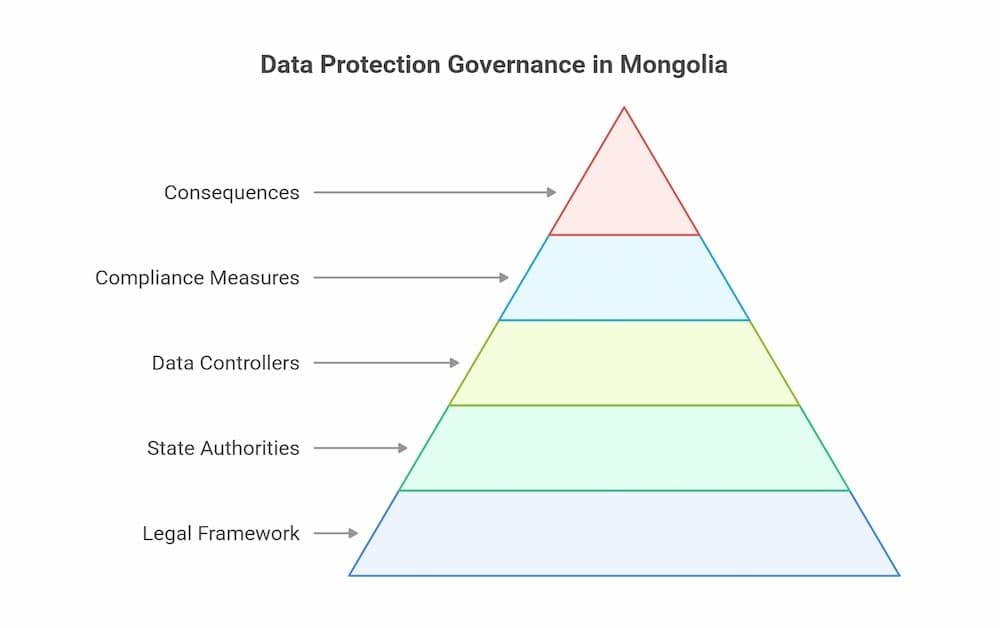Introduction
Mongolia’s Law on Personal Data Protection establishes a comprehensive legal framework to regulate the collection, processing, use, and security of personal data. It applies to all individuals, legal entities, and non-legal entities operating in Mongolia. The law applies to any individual, legal entity, or non-legal entity that collects or processes personal data within Mongolia. The law is intended to ensure the protection of personal data, uphold human rights, and safeguard freedoms by minimizing the potential negative consequences of data processing activities.
Personal data under this law includes any data that can directly or indirectly identify a person. This encompasses sensitive personal data such as genetic and biometric data, digital signature private key information, details related to a person’s sexual and gender orientation, and a person’s race. Other forms of sensitive information include citizens’ registration numbers, family relations, employment records, electronic identifiers, and criminal records. A citizen’s registration number is specifically protected as personal data under the law. The law emphasizes the need to handle these data categories with the highest degree of care and confidentiality.
Data subjects, the individuals to whom the data relates, are given strong rights under the law. The law also protects other persons related to the data subject, such as family members or legal representatives. These include the right to provide or withdraw written consent, access their data, request rectification or deletion, object to processing, and demand data transfer. Complaints for violations can be filed with the relevant state authority, including the National Human Rights Commission and the Ministry of Digital Development, which are responsible for ensuring compliance with the cybersecurity law and other applicable laws.
Key Provisions and Requirements
A central pillar of Mongolia’s personal data protection framework is the role of the data controller, who determines the purposes and means of data processing. Data controllers, including both legal and non-legal entities, must obtain the data subject’s written consent before collecting or using personal data unless a legal basis exists under other laws or international treaties. If the data subject is a minor or legally incapacitated, consent must be obtained from their legal representative. This consent must be freely given, informed, and documented in electronic form or in writing.
When dealing with sensitive personal data, such as biometric data, sexual orientation, or digital signature private keys, the requirements are even stricter. Such data can only be processed under clearly defined legal exceptions, and unauthorized collection or use can result in criminal liability. The law contains specific provisions for processing such data, including requirements for consent and documentation. Data controllers must prevent violations of freedoms and avoid possible negative consequences by strictly limiting the scope of processing and applying rigorous data security measures.
Employers can process biometric data for internal labor procedures, such as timekeeping or access control, but only with employees’ consent. They cannot transfer, alter, or use such data outside the agreed-upon purposes and must comply with labor law, the law on personal data, and other relevant data and employment regulations. In cases involving employment relations or the use of electronic identifiers, strict safeguards are necessary to protect the personal secrets and legitimate interests of employees. In the event of a data subject’s death, consent for data processing may be obtained from a family member or legal representative, as stipulated by the law.
The law also sets clear obligations around data transfer. Cross-border data transfer is permitted only if adequate protection is ensured in the receiving country or under applicable international treaties. Data controllers must implement legal, technical, and organizational measures to secure the transfer and ensure that personal data is protected from unauthorized access and disclosure.

Information Security and Personal Data Protection Measures
To protect personal data and maintain public trust, the law mandates robust information security standards for both data controllers and processors. These include ensuring the confidentiality, integrity, and availability of the information system used for data management and security. Compliance with the cybersecurity law is essential, and failure to do so may result in serious sanctions, including criminal prosecution under the Criminal Code.
The Ministry of Digital Development plays a key role in issuing specific information security requirements, particularly for sensitive personal data. These include standards for secure storage, encrypted transmission, and controlled access. Sensitive information, such as data that can potentially identify a person through electronic identifiers or relate to sexual relations, must be encrypted and anonymized where possible to prevent misuse. Biometric data, which is derived from the human body—such as fingerprints, iris scans, or facial features—requires special protection due to its unique and personal nature.
In the event of a data breach, the law requires immediate notification to both the data subject and the relevant state authority if the breach is likely to affect rights or legitimate interests. Data controllers must take necessary measures to contain and mitigate the breach, as well as investigate and document the incident. This duty of care helps to protect freedoms and prevent human intervention that may cause further harm.
The legal framework also integrates the cybersecurity law and electronic signature law, ensuring consistency in handling digital identifiers, such as digital signatures, and maintaining data authenticity. Criminal liability is established for serious breaches of data protection obligations, including unlawful collection, processing, or transfer of sensitive personal data such as genetic data or criminal records.
Enforcement and Governance
The enforcement and governance of personal data protection in Mongolia are anchored by a network of dedicated state authorities, each playing a vital role in upholding the Law on Personal Data Protection. Chief among these are the National Human Rights Commission and the Ministry of Digital Development, Innovation, and Communications, both of which are tasked with ensuring that data controllers—including legal entities, non-legal entities, and individuals—adhere to the highest standards of data protection.
The National Human Rights Commission serves as a key watchdog, empowered to investigate complaints related to the collection, processing, and use of personal data. This includes oversight of sensitive personal data such as genetic and biometric data, as well as other categories that could directly or indirectly identify individuals. The Commission conducts regular inspections and monitoring activities, ensuring that data controllers implement robust measures to protect personal data and uphold the rights and freedoms guaranteed by law.
Complementing this oversight, the Ministry of Digital Development, Innovation, and Communications is responsible for shaping and enforcing policies that support personal data protection. The Ministry develops guidelines for the secure use of electronic signatures and the safeguarding of digital signature private keys, and it oversees the implementation of the Cyber Security Law. This ensures that data security remains a top priority in Mongolia’s rapidly evolving digital landscape.
Data controllers are required to establish comprehensive internal policies and procedures for data collection, data processing, and data transfer. These measures must address the protection of sensitive personal data, including biometric data, and ensure that all employees understand their obligations under the law. Regular training and awareness programs are essential to maintaining compliance and preventing unauthorized access or misuse of personal data.
Failure to comply with the Law on Personal Data Protection can result in significant consequences. Data controllers may face administrative sanctions, including fines, for breaches of data protection obligations. In more serious cases, the Criminal Code of Mongolia provides for criminal liability if the unlawful collection, processing, or use of personal data causes harm or infringes on the rights and freedoms of individuals. This legal framework underscores the importance of protecting personal data and deters negligent or malicious behavior.
Enforcement and governance are further reinforced by Mongolia’s commitment to international treaties and the integration of other applicable laws, such as the Public Information Transparency Law and the Electronic Signature Law. These laws provide additional layers of accountability and ensure that data controllers are held to consistent standards, whether handling data domestically or in the context of cross-border data transfer.
Ultimately, strong enforcement and governance mechanisms are essential for building public trust in Mongolia’s digital development initiatives. By holding data controllers accountable and promoting best practices in personal data protection, Mongolia is well-positioned to realize the benefits of digital innovation while safeguarding the human rights and freedoms of its citizens.

Implications and Future Directions
The introduction of Mongolia’s Law on Personal Data Protection has considerable implications for businesses, government institutions, and international organizations operating within the country. All data processing activities must now align with the law’s provisions, and organizations must adopt internal policies and technological systems that support personal data protection, especially when handling sensitive data and other sensitive information.
Businesses, including foreign companies, must conduct internal audits of data processing activities, review consent mechanisms, update privacy notices, and train staff on compliance. Particular attention must be paid to processing data that may indirectly identify a person or involve biometric data collected in the context of investigating crimes or public information transparency law obligations.
The law reflects global data protection principles, aligning with frameworks like the EU’s GDPR and OECD Guidelines. It aims to foster trust among citizens and promote data-driven innovation while respecting individual rights and freedoms. Foreign companies engaged in cross-border data transfer must also comply with international treaties and submit to the requirements of the competent authority to ensure lawful processing.
Future developments are expected to include the issuance of sector-specific guidelines, especially in areas such as healthcare, border protection authority procedures, and the use of statistical information for policy-making. These regulations will provide further clarity on data controller obligations, legal basis for processing, and protective measures against misuse of sensitive data related to a person’s race, gender orientation, or criminal history. The state registration authority will play a key role in maintaining registries of biometric and genetic data and verifying identities for legal, security, and public service purposes.
In the context of border protection authority procedures, the law covers the collection and processing of biometric data for foreign citizens and foreign citizens crossing national borders, ensuring proper identification and compliance with immigration and border control requirements.
When using data for policy-making and research, the law allows for data to be used in creating historical, scientific, or literary works, provided that appropriate consent is obtained or data is de-identified to protect individual privacy.
The establishment of a specialized data protection authority is anticipated to enhance oversight and public awareness. Such a body would have the authority to issue binding guidance, investigate violations, and impose administrative fines or criminal sanctions where necessary. This will strengthen the enforcement of the law and reinforce public trust in digital services.
Additionally, technological innovation and digital transformation in Mongolia will be shaped by how well organizations implement the law’s mandates. Initiatives under the digital development agenda must integrate data privacy principles, especially when handling electronic signatures, electronic form submissions, and data involving foreign citizens or their legal representatives crossing the border.
Conclusion
Mongolia’s Law on Personal Data Protection marks a significant step in protecting personal privacy, human rights, and data security in an increasingly digital society. The law establishes clear responsibilities for data controllers and sets out comprehensive protections for data subjects, particularly regarding sensitive personal data like genetic and biometric data, digital signature private key information, and information that can directly or indirectly identify individuals.
By enforcing strict requirements on data collection, processing, transfer, and security, Mongolia has created a modern legal framework that not only aligns with international standards but also addresses the specific needs and challenges of its own digital environment. As enforcement mechanisms evolve and public awareness grows, the law will continue to play a critical role in shaping how personal data is handled and protected in Mongolia.
The effective implementation of this law will depend on ongoing collaboration between legal entities, non-legal entities, the government, and civil society. This includes ensuring compliance with applicable laws, developing sector-specific guidelines, and promoting responsible data processing activities to prevent negative consequences and uphold freedoms protected by the constitution.



